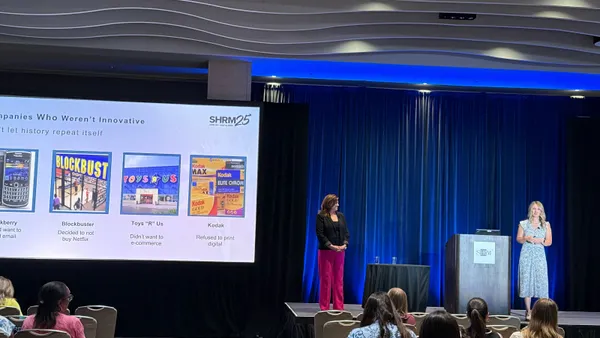The half-life of skills is shrinking. Consider this: The majority of what we learned 10 years ago is obsolete, and half of what we learned five years ago is irrelevant. And what about looking ahead five years? More than one-third of the skills necessary to thrive in a job today are projected to change.
With the proliferation of technology transforming the way we connect, communicate and conduct business, the result is a shifting labor market. Even if your workforce possesses highly qualified skills today, their relevance could begin diminishing tomorrow. That’s why it’s never been more important to find people who enjoy learning and pursue it on their own.
Employers can start by shifting away from their traditional hiring model to focus more on a person’s capabilities than on the hard skills they possess. From there, ongoing investment must be made in supporting employees’ desire to keep learning and growing.
Rethink how you’re assessing skills
A big drawback of the traditional hiring process is that it places too much emphasis on the applicant’s existing technical skills while virtually ignoring soft skills. Too often, we see job postings dominated by checklists of requirements and interviews filled with a series of technical challenges. While each skill is undoubtedly important, hiring and searching for current skills alone fails to surface other important elements of a candidate’s character, such as how they approach problems and interact with colleagues.
When you meet a candidate, challenge yourself to assess their willingness to collaborate, their alignment with company values and, most notably, their ability to adapt and grow into increasingly complex roles and environments. In other words, you’ve got to think about how well and how willingly they learn.
Surface the “adaptable learner”
The “adaptable learner” is the holy grail of talent because they proactively keep their skill set up to date and continually seek out new knowledge. Forward-thinking companies have already adopted models to surface this kind of talent.
For example, Zappos doesn’t use regular job postings. Instead, the company’s recruiters get to know applicants one by one through online chats. They invite candidates to company meetings and events to see how they interact. Zappos believes that an employee who embraces a company’s values and finds purpose in their work is much more likely to be adaptable to changing conditions and add value along the way.
Instead of running through a laundry list of required skills in interviews, focus on questions that reflect output over process or reveal improvement over time. Examples:
-
Can you describe a situation where you adeptly maneuvered through a period of change?
-
What makes you so passionate about this specific position?
-
What types of skills do you hope to develop as you grow into this role?
This allows employers to pinpoint candidates with a mindset for continuous growth. And that’s the kind of talent you want because it signals an attitude of continuous improvement, both for themselves and their work for your business.
Invest in professional development
Company culture plays as large a role as the employees you choose to bring into the fold. To keep learners engaged and appreciated, you must foster a culture that celebrates the process of developing competencies, ideas, and knowledge, rather than just tracking performance metrics.
To cultivate your own learning culture, you need to show it’s a priority by investing in professional development and giving employees access to diverse learning programs that help them gain the skills they need today as well as the competencies that will keep them productive in the future. Future-focused learning organizations blend formal and informal workshops and self-paced courses tackling both technical and soft skills.
Above all else, companies must ensure they don’t fall victim to rigid organizational inertia. Businesses and employees alike must jump on every opportunity to learn and never assume anyone’s development is “done.”
Editor's note: This is a guest contribution from Darren Shimkus, general manager at Udemy for Business.












